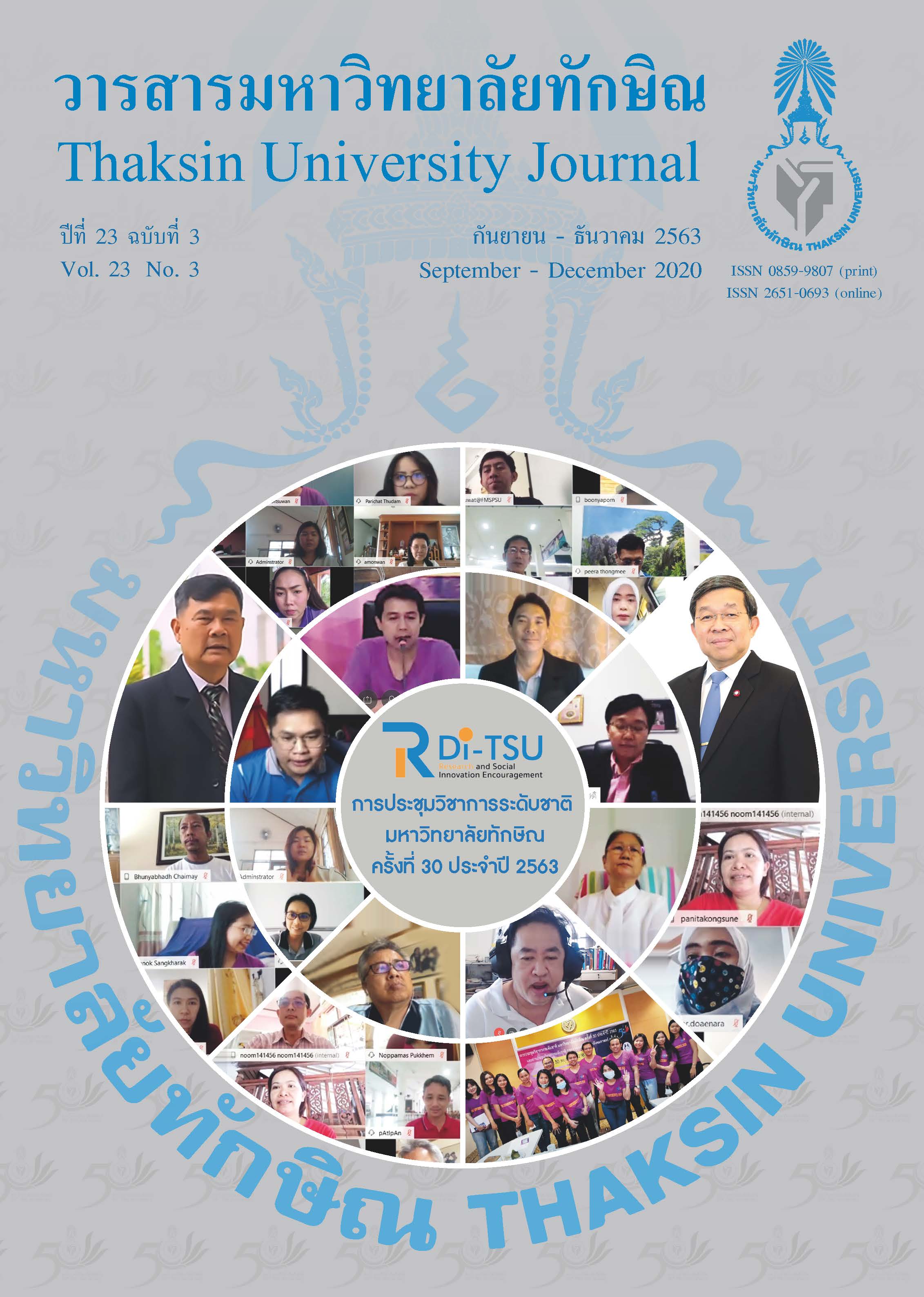The Development of Android Application for Disseminating Thai Cultural Heritage of the Lower Southern Provinces of Thailand
Main Article Content
Abstract
Cultural heritage is a valuable thing. People in the community should be proud and preserved their culture for a long time. This research focuses on the design and development of mobile applicationson the Android operating system. This research focuses on the design and development of mobile applications on the Android operating system for preserving the cultural heritage of the lower southern provinces of Thailand, such as Rong Ngeng, Sila, Mayong, Ba-nor. The objectives of this research are 1) to study the process of developing mobile applications on the Android operating system. 2) to design and develop mobile applications on the Android operating system for the dissemination of the cultural heritage of the lower southern provinces of Thailand. The research began with the study of mobile application development using SDLC, the Ionic framework was used for designing the user interface, the MySQLi database, JSON platform used for transmitting data, and XAMPP was used for webserver management tools. The research development process are 1) collect and categorize information on cultural heritage, and 2) design menus and user interfaces to be attractive, easy to use, quick, and reliable. The sample consisted of 35 people. The tools for testing research are 1) mobile applications on the Android operating system. 2) the questionnaire. The results showed that 1) the level of satisfaction with user interface design is very high (Mean = 4.24, S.D. = 0.59), and 2) satisfaction level of reliability and benefit is very high, (Mean = 4.11, S.D. = 0.67). The conclusion of the research shows that the development of mobile applications can be
used for the conservation and dissemination of the Thai cultural heritage for a long time. These valuable things will not disappear from the community.
Article Details

This work is licensed under a Creative Commons Attribution-NonCommercial-NoDerivatives 4.0 International License.
References
Naco, A. (2017). Knowledge-based system of art and culture in the context of folk wisdom case study: Phatthalung province. Thaksin University Journal, 20(3), 292–299.
Nattha, P. & Prisana, M. (2017). The development of the augmented reality application for arts, culture and local wisdom learning support on alms bowl making at Ban Batra Community. Parichat Journal, 31(1), 241-262.
Ariffin, S.A., & Dyson, L.E (2015). Culturally appropriate design of mobile learning applications in the Malaysian context. In P. Rau (Ed). Cross-Cultural Design Applications in Mobile Interaction, Education, Health, Transport and Cultural Heritage. CCD 2015. Lecture Notes in Computer Science, vol. 9181. 3–14. Switzerland: Springer, Cham. DOI: https://doi.org/10.1007/978-3-319-20934-0_1.
Park, H., Kim, E., Kim, H., Shin, J., Kim, J., Kim, K., & Woo, W. (2018). K-culture time machine: a mobile AR experience platform for Korean cultural heritage sites. In S. Yamamoto & H. Mori (Eds). Human Interface and the Management of Information. Information in Applications and Services. HIMI 2018. Lecture Notes in Computer Science, vol 10905. 167–180. Switzerland: Springer, Cham. DOI: http://doi-org-443. webvpn.fjmu.edu.cn/10.1007/978-3-319-92046-7_15.
Numnon, T. (2020). Thais spend time on the internet with the ‘top five’ in the world (Online). Retrieved March 1, 2020, from https://www.bangkokbiznews.com/blog/detail/649531.
Puttitaweesri, P., Kranruang, D., & Rimphati, W. (2019). Development of smartphone-based navigation system in Ratchaburi. Thaksin University Journal, 22(1), 97–108.
Salgamcıoglu, B. K. (2019). Future older adults and mobile applications for health. In A Woodcock, L. Moody, D. McDonagh, A. Jain & L. C. Jain (Eds). Design of Assistive Technology for Ageing Populations. Intelligent Systems Reference Library, 167. 275–292. Switzerland: Springer, Cham. DOI: https://doi.org/10.1007/978-3-030-26292-1_15.
Nasir, H., Aris, A. N., Lajis, A., Kadir, K., & Safie, S. I. (2018). Development of Android application for pest infestation early warning system. In The 2018 IEEE 5th International Conference on Smart Instrumentation, Measurement and Application (ICSIMA 2018), 1–5. November 28–30, 2018, Songkla, Thailand. DOI: 10.1109/ICSIMA.2018.8688774.
Boonnuddar, N., & Wuttidittachotti, P. (2017). Mobile application: Patients' adherence for medicine in-take schedules (Online). Retrieved March 1, 2020, from https://dl.acm.org/doi/pdf/10.1145/3175684.3175714.
Thailand Discovery. (2015). Thai Culture Mobile Application (Online). Retrieved March 1, 2020, from https://www.thailanddiscovery.info/thai-culture-mobile-application/.
Thawatchai, S. (2019). The development of augmented reality application “Sadue E-San”, Kosum Phisai District, Maha Sarakham Province. Sripatum Review of Science and Technology, 11, 139–151.
Hajiheydari, N., & Ashkani, M. (2018). Mobile application user behavior in the developing countries: a survey in Iran. Information Systems, 77, 22–33.
Nuanmeesri, S. (2019).Mobile application for the purpose of marketing, product distribution and location-based logistics for elderly farmers. Applied Computing and Informatics, Emerald Publishing Limited 2210-8327. 1–20. DOI:10.1016/j.aci. 2019. 11.001.
Ministry of Culture. (2020). Intangible Cultural heritage (Online). Retrieved March 1, 2020, from http://ich.culture.go.th.
Pattani Province. (2020). Thai cultural heritage Ma Yong (Online). Retrieved March 2, 2020, from https://sites.google.com/site/thaukaenoi/kar-la-len-phun-meuxng/ma-yong.
South Deep Outlook. (2020). Ma Yong (Online). Retrieved March 2, 2020, from https://www. southdeepoutlook.com/ShowAllDetails/detail_south_editorial/78.
Songkhla Community Foundation. (2020). Ma Yong: culture brings to peace. (Online). Retrieved March 2, 2020, from https://www.songkhlahealth.org/paper/1671.


